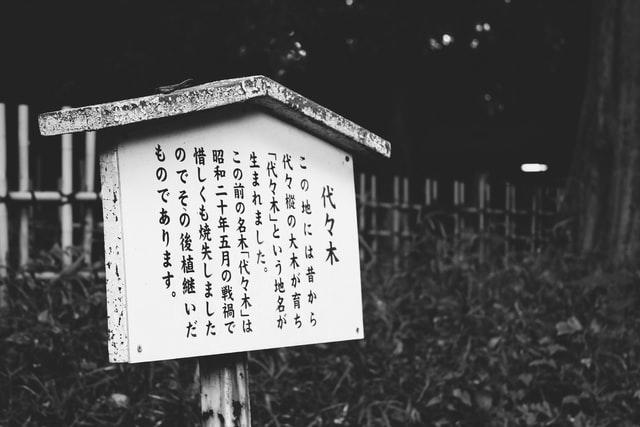Japanese culture — whether it is the language, food or philosophies — has always fascinated people from everywhere.
This interest has grown with the advent of a growing Manga and anime fan base. From Nijigahara Tunnel and the Fullmetal Alchemist to Toukaido Hisame, both the stories and the Japanese names of the characters carry unique and special meanings.
Unlike most western cultures, in Japan, parents are meticulous about naming their children. Both first names in Japanese as well as Japanese family names are considered highly.
In this article, you’ll find out some of the remarkable aspects of Japanese names and what they mean.

Names in Japanese: All You Need to Know
"What's in a name?"
From Romeo and Juliet by William Shakespeare
In this critical scene, Juliet presents a logical argument: regardless of what we call a rose, it would smell sweet anyway. It’s true, except when it comes to names in Japanese which hold much weight.
Both Japanese surnames (or Japanese family names) and first names are extremely important.
- The first important rule is that in Japan, the Japanese family name is given first which is then followed by the given name. For example, the baseball player Suzuki Ichiro's surname is Suzuki. The same goes for the famous figure skater Hanyu Yuzuru. Hanyu is his surname and will continue the family line.
- Strangely enough, when a westerner says a Japanese person's name, they tend to reverse the order. That could mean that we have been addressing the Prime Minister incorrectly. Instead of Yoshihide Suga, we should say Suga Yoshihide. Suga is his surname and using Japanese surnames should come first.
- You may have already noticed that names in Japanese do not include a second given name or middle name.
- In Japan, it would be considered rude and highly unusual to call someone by their given name. This is the rule even if you have known them a long time. Instead it is culturally appropriate to use Japanese surnames when addressing them and then to attach the word ‘san’ as an extra sign of respect. If you are wondering what does the san mean in Japanese consider that to address the Prime Minister, you would say Suga san.
- Children can be called by their given names, however, by school going age they should also be called by Japanese family names, followed by san.

So if you have asked what does the san mean in Japanese, it is one of the important ways that extreme politeness is extended in Japanese culture.
Another way to demonstrate the sacredness of Japanese names is that they are always written in kanji (ancient Chinese characters). Of course, this can be confusing for Mandarin readers because Japanese characters sound nothing like Chinese, or even have the same meaning!
For example, Nakata (or Nakada), ??, is one of those well-known Japanese family names, however a Mandarin speaker would automatically read it as 'zhong tian', which means 'middle field'!
To complicate it further, sometimes these Japanese surnames don’t have the same meaning even when they are read in Japanese. These language nuances, which are important, are not something that you will encounter in a Basics Japanese course.
Added to this, there’s also a growing preference to write Japanese surnames in traditional characters which are more elaborate and certainly more complex than simplified kanji.
Japanese Family Names
Japanese surnames are so important that unlike other East Asian cultures, there are more than 138 000 surnames. Compare that to China which has around 150 or Korea which has over 280.
As mentioned, Japanese names are usually written in kanji and consist of between one to four characters.
Japanese surnames generally consist of words and phrases that invoke natural elements: bamboo, wind, wood and water. They also incorporate direction type words like side and front or north and east. Topography type elements like valley, pond, field and village are included as well.
Japanese family names are patrilineal, which means that they are passed down through the father's lines. When women marry, like in western culture, they tend to adopt their husband's surname.

Japanese Given Names
Just about every culture has unspoken rules for naming children. Of course in Japan where names are written in kanji and where you may be wondering what does the san mean in Japanese, it can be slightly more confusing!
When names are written in Chinese idiograms (kanji) it can become even more ambiguous. For this reason, many official documents require that names are written phonetically in furigana.
While you don’t need to have mastered the entire Japanese alphabet, you will need to know kanji to read family names and most male given names. Bear in mind that female names can be written in katakana or hiragana.
The Japanese actually government maintains a list of approved names that new parents can select. When a new parent wants to use a name that is not on the list they can run the risk of being refused, especially if the name is not in line with the extreme respect that names in Japanese culture should invoke. Fortunately, the Japanese have many names to choose from, even if the chances of finding non-gendered names are slim.

Japanese Names for Boys
In Japan, most boy’s names will end in shi, hei, suke or hiko. For example, Keisuke, Satoshi or Keisuke.
Further standard suffixes for boys ‘include kazu and ichi. Be aware that both of these can also denote that the child is a first born, for example, Ichiro.
Of course, one cannot name a child Five or Thirteen. However, although symbols and numbers are not on Japan’s accepted list of names, some boys' names may contain numbers. For example, a couple’s third son may include ? which means three.
As a rule of thumb: if a name ends in -o, then the child is likely a male. Another helpful indicator that a name is for a male is when it conveys power and strength. Boys names usually represent concepts of courage, victory, pride and so on.
Japanese Names for Girls
While male given names tend to suggest power and strength, Japanese names for girls usually reflect virtue and beauty. Indeed, beauty (-mi, ?) is a common suffix for Japanese girls, for example: Satomi, Masumi and Narumi.
Child (-ko, ?) is also a popular suffix for girl-names, for example, Seiko, Etsuko and Miyoko.
Don’t forget of course to always add san. If you are still wondering what does the san mean in Japanese – it is custom to add it on to the end of a name as a sign of respect.
Just like other cultures - including ours, most Japanese female names end with –a but boys' names usually don’t. So, if a name ends in -ka or -na, it is safe to assume that the child is female. Other endings for girl names include yo and e.
Female babies are not given any numbers in their names like boys are. So while a family may have sons called Tomokazu (kazu=1st) or Koji (ji=2nd) and Zenzo (zo=3rd), the daughters in that same family will not be counted.
Another interesting fact about Japanese given names: fortune-telling.
In many Asian cultures, some numbers are considered more fortunate than others. In the same way, certain numbers are avoided at all costs and even considered to be ill omens. For example, the number 4 (?, shi) sounds like 'death' - in Japanese, Chinese and Korean!
When considering suitable names for their children, parents will favour those that have a 'lucky' amount of strokes. Eight is meant to be the most fortuitous of all numbers, so any child’s name that requires eight strokes of a pen is highly considered while one with nine strokes is immediately rejected.
This unique method of selecting names is called seimei handan. To understand this fully, make sure you know more about Japanese numbers.

Japanese Names for Foreigners
In Japanese, words of foreign origin are always written in katakana where each syllable receives approximate pronunciation. This can include everything from hamburgers to city names and of course given names.
The name Naomi, however, offers an interesting example.
Naomi is on the Japanese list of acceptable names and is popular because of its –mi suffix. However, a Japanese woman named Naomi (N?omi) will pronounce their name differently to a foreign Naomi (Nau o mi).
For foreigners whose names are already written in kanji - the Koreans and Chinese for instance, their names don't need conversion; they need only to mind the difference in pronunciation.
If you, like so many other ambitious individuals, plan to study or work in Japan, you will have to figure out what you would like to be called. Find out how to translate your name into hiragana ahead of time.
This way, when you introduce yourself, you’ll be doing so with confidence. What a fantastic way to make sure that you get off on the right foot!
Summarise with AI:
















